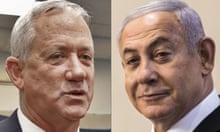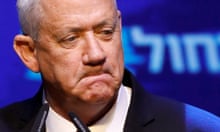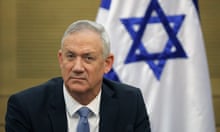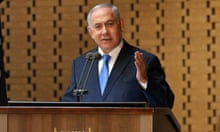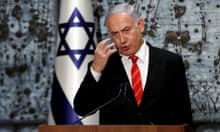Dark-green date palms stand out against the sprawling desert that descends sharply from the hills of Jerusalem to the Jordan River. To the south, the Dead Sea – the lowest place on the surface of the Earth – shimmers under an oppressive summer haze. Just a few miles north, the Palestinian city of Jericho bakes in the sun.
If Benjamin Netanyahu is to be believed, this land – biblical, strategic, mythical – will soon be stripped of its status as part of Palestine. It will be declared by unilateral decree as Israel, as much as Tel Aviv or the Red Sea city of Eilat.
“I think Israel will do the impossible,” said Hussein Atiayat, a 65-year-old Palestinian whose family have lived in the valley for generations. “The whole world is supporting him. So what can the Palestinians do?” he added. “We are already destroyed: financially, spiritually, socially.”
The Israeli leader announced his plan in his signature dramatic fashion on Tuesday evening, standing in front of a map of the occupied West Bank and promising to extend Israeli sovereignty over large swathes of it.
Netanyahu is battling for his political survival before next Tuesday’s election, and the announcement was brushed off by some as a campaign stunt. But for Palestinians in the Jordan valley who have lived through half a century of military rule, his words are not to be taken lightly.
“I’m a simple person, but my vision of what might happen is that we will be locked in our town,” said Atiayat. “Life will be miserable.”
If carried out, Netanyahu will have smashed one of the biggest taboos of the already moribund peace process. Since Israel captured the West Bank in the 1967 six-day war, it has kept hold of the land under the appearance of a temporary occupation.
That occupation would be turned into a delayed military conquest, a scenario that would kill off notions that Palestinians may be able to build a state alongside Israel, rather than live under some form of its rule indefinitely while unable to vote.
“We haven’t had this kind of opportunity since the six-day war, and may not have it again for another 50 years,” Netanyahu said.
As well as roughly 65,000 Palestinians, the valley is home to about 11,000 settlers whose leaders immediately applauded the prime minister’s speech, calling it “a historic event” and “unprecedented news for the state of Israel”.
The groundwork has already been set since Donald Trump came to power. The US president recognised Jerusalem, part of which Palestinians claim, as Israel’s capital. And earlier this year, he also recognised Israeli sovereignty over the Golan Heights, a plateau Israeli forces captured from Syria in the same 1967 conflict.
Netanyahu’s new plan would slice off the eastern side of the West Bank, leaving the rest encircled by Israeli territory. Coupled with a previous vow he made to annex all settlements, it would also trap Palestinians in disjointed city enclaves.
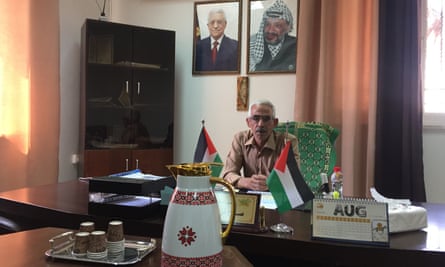
Atiayat lives in the small town of Auja, just a few miles north of Jericho. Like many Palestinians, he is a refugee, displaced from his ancestral village decades ago by Israeli troops. Now he is deputy mayor of the local municipality and sits at his desk, a photo of the late Palestinian leader Yasser Arafat behind him.
Under Netanyahu’s suggestion, Auja and Jericho will not be brought into Israel but squeezed into a cutoff area, save for three roads to connect it to other Palestinian towns. Including them would have meant recognising tens of thousands of Palestinians as Israel citizens – something that horrifies many rightwingers who fear it would threaten the country’s Jewish majority.
“It would be better for us to live in one state. Everyone would get the same rights,” Atiayat said. But Netanyahu made clear that not “a single Palestinian” will be granted citizenship.
Some Palestinians already say they live under a quasi-annexation. Many foreign tourists on bus trips to the Dead Sea will drive right through the Palestinian territories without realising they have left the country.
Road signs often display Hebrew and frequently ignore Palestinian communities, pointing out Israeli settlements instead, while many petrol stations and shops are Israeli-run. Border crossings with Jordan are controlled by Israel, which has built military bases and even national parks in the valley.
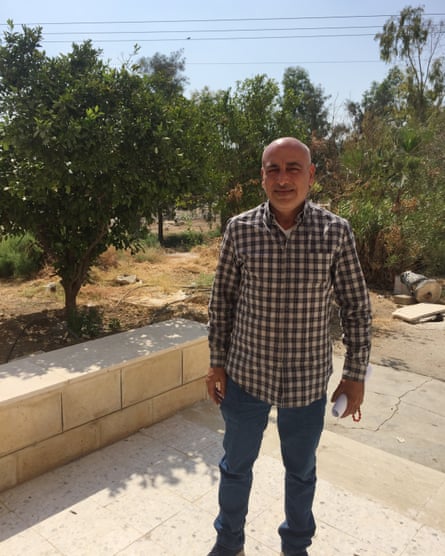
For years, Palestinian farmland has been confiscated and handed to settlers, while water is diverted from Palestinian villages and people are regularly blocked from moving around.
Ibrahim Qtishat, an agricultural engineer, has lived in Jericho for two decades. Last year, he rented a large farm outside Auja to plant dates. Now his land could suddenly become another country.
“Most of the people in this area are farmers,” he said. “Most will lose their jobs.”
Despite claims of electioneering, the Israeli prime minister’s plan is clear to Qtishat. “Netanyahu doesn’t want to see any Palestinians. If he doesn’t allow people to cultivate, they will leave.”




